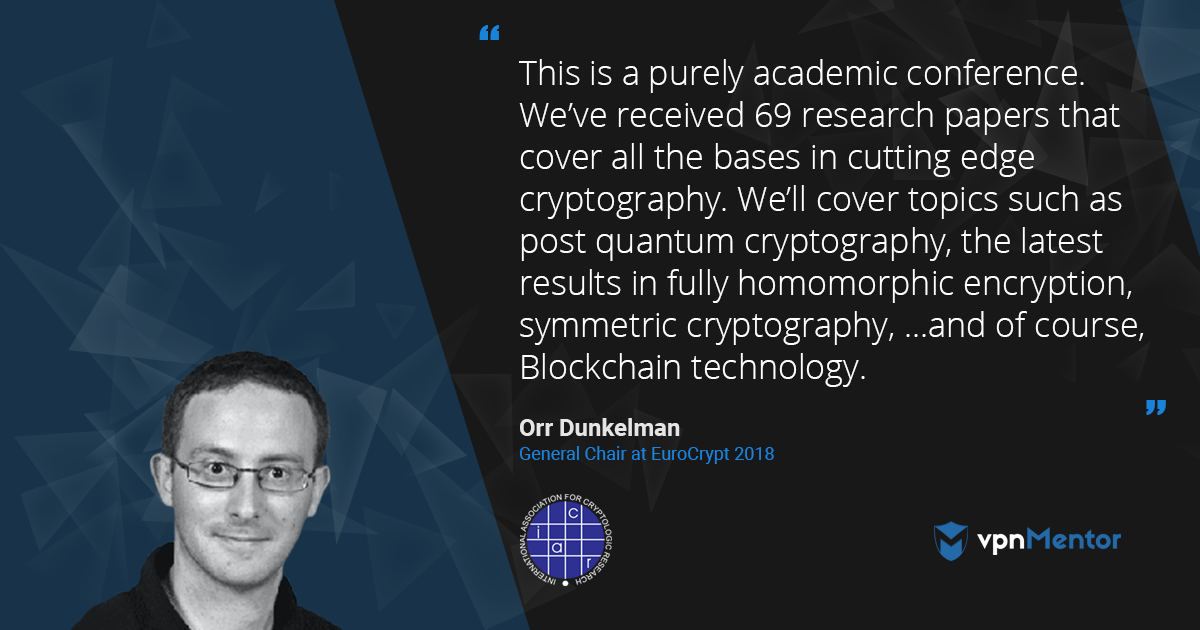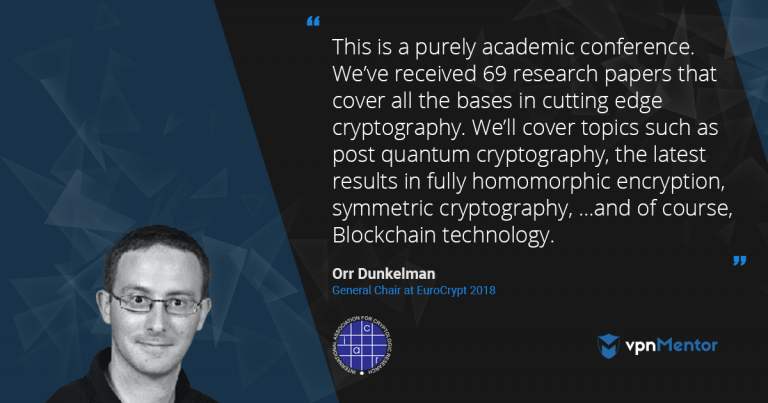
Getting Ready for EuroCrypt 2018 with Orr Dunkelman
For the past 30 plus years, the IACR (International Association for Cryptographic Research) has been at the cutting edge of cryptographic research. They run three conferences a year; Crypto (In the United States), EuroCrypt and AsiaCrypt.
I spoke with Orr Dunkelman, General Chair for EuroCrypt, which is taking place in Tel Aviv, Israel from April 29 – May 4, about the conference and what we can expect.
Can you tell us a little background on EuroCrypt and what we can expect from the conference?
This will be the 37th annual EuroCrypt – and the first time it is being held in Israel. It is an academic conference that covers all aspects of cryptography.
Back in the 1980’s the focus was on digital cache. Zero-knowledge proofs were discussed in the 80’s and 90’s. There were discussions about encryption and cryptanalysis. Some things even crept into the public forum, such as the Dual EC scenario and the NSA was first presented at Crypto in 2007, with people finding find bugs and backdoor issues. We’ve become a meeting point for cryptographers.
I want to add a disclaimer, this is an academic conference and it’s something for people who want to know what the cutting edge of cryptography is. I have to admit, some of the talks will be highly technical, from a cryptographic research perspective, and not necessarily for everyone. You’ll need more then just a background knowledge on these topics.
How many people are expected to attend
As of now we have over 350 people registered for the full program, and registration is still open so we may see an increase in numbers. We’re trying something new this year, due to the popularity of Blockchain, we’re selling tickets for people who are only interested in coming the Blockchain track on Tuesday, May 1st. It should be a bit more accessible to general public, from a technical standpoint, but will still be a very high level.
Furthermore, two workshops, which have attracted registrations from over 80 participants, are scheduled for Sunday, the 29th, prior to the official commencement of the event.
The participants will be coming in from all over the world, including Israel, Austria, Belgium, Switzerland, Germany, US, UK, Canada, Bulgaria, China, Brazil, Czech Republic, France, Hong Kong, Korea Poland, Russia, Singapore, Turkey, and Ukraine.
What is the focus of the conference?
This is a purely academic conference. We’ve received 69 research papers that cover all the bases in cutting-edge cryptography. We’ll cover topics such as post-quantum cryptography, the latest results in fully homomorphic encryption, symmetric cryptography, modes of operations - this has become a big issue with many attacks on TLS and SSL are based on this. Of course, Blockchain technology and how to improve it and what other applications can it be used for. Hardware securities and how you can protect the limitations in hardware, pretty much anything you can think of when cryptography comes up on your mind will be discussed.
This is a conference for people who want to hear about the cutting edge of cryptography. While the talks and presentations are important, another important aspect is for people close to the field to see where the community is heading and what the urgent issue are to address. For example, we’ve been discussing Post-Quantum Cryptography for the past 3 years, in a very excessive manner. Because, suddenly we had seen signals from the quantum computing world that quantum computers will be ready sooner than you think and we need to prepare the quantum cryptographic infrastructure in advance.
NIST (National Institute of Standards and Technology) recently started a competition for selecting post-quantum cryptographic standards, so we’re trying to prepare for the earthquake in advance so to speak, because many of the current internet protocols we currently have will break, and a lot of the infrastructure will need to change. So, we are trying to be prepared for the future, and make the changes now, while it isn’t urgent instead of being in a situation where everything must be changed NOW NOW NOW.
So, we can see where the committee is heading, and what our focus is. There will be a session about TOR and anonymous connections. Again, it will be from a technical angle looking at cryptographic details on the Onion encryption.
Can you tell us a little bit about the structure of the conference?
There will be two tracks throughout the conference and people can switch back and forth, depending on what topics are more relevant or interesting to them.
In addition to the tracks we’ll have two Invited Talks (keynote speakers), Matthew Green will be giving a talk titled Thirty Years of Digital Currency: From DigiCash to the Blockchain. The second speech will be given Anne Canteaut titled Desperately Seeking SBoxes.
One of the more entertaining programs we have is the Recent Results, or Rump session, which will take place on Tuesday night. This session is less formal than the presentations and allows for back and forth discussions. In the past there has even been some singing and dancing at the Rump sessions. It is the unwinding opportunities for the attendees.
As mentioned earlier there will be two workshops that people can register for before the event. The first one is lightweight cryptography; topics such as Cryptography for Constrained Environments, IOT Devices and the like. The second workshop is on the State-of-the-Art Cryptography and this is the 13th year that it is being organized by Intel. It will cover topics such as Spectre and Meltdown and encryption laws. These workshops are less formal and allow for people to interact and argue back and forth with the presenters.
Finally, we will be awarding the Best Paper Award, a panel of educators and judges will read over the submitted papers and vote on a winner.


